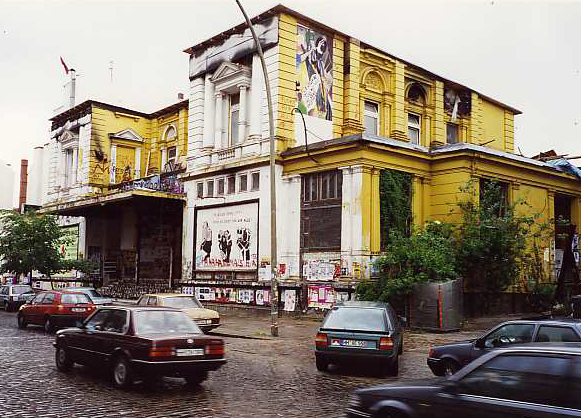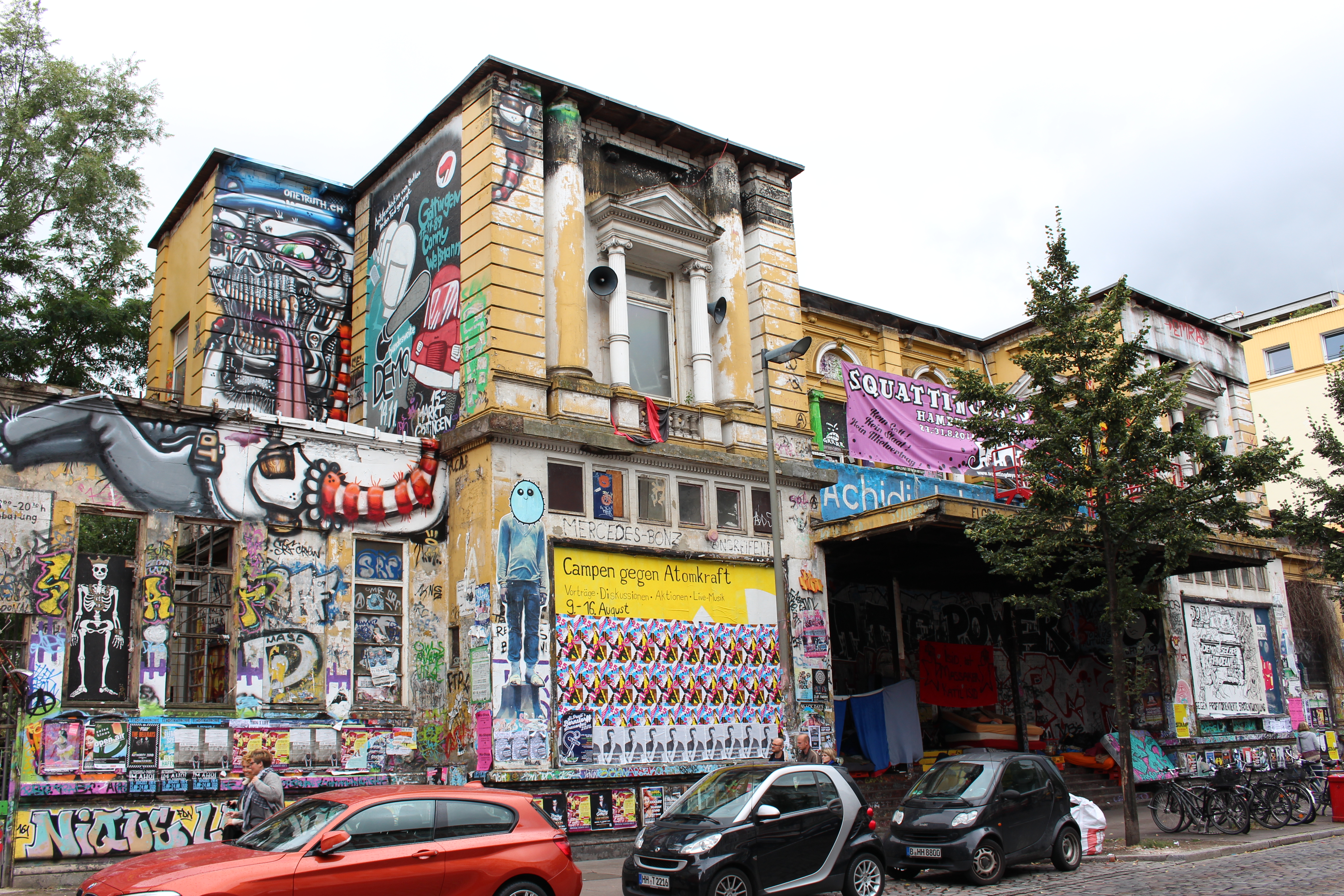Rote Flora on:
[Wikipedia]
[Google]
[Amazon]

 The Rote Flora is a former theatre in the Sternschanze district of
The Rote Flora is a former theatre in the Sternschanze district of
Official website (German)
{{Authority control Anarchism in Germany Autonomism Buildings and structures in Altona, Hamburg Former theatres in Germany History of Hamburg Infoshops Politics of Hamburg Squats in Germany Theatres in Hamburg
Hamburg
Hamburg (, ; nds, label=Hamburg German, Low Saxon, Hamborg ), officially the Free and Hanseatic City of Hamburg (german: Freie und Hansestadt Hamburg; nds, label=Low Saxon, Friee un Hansestadt Hamborg),. is the List of cities in Germany by popul ...
, Germany. It has been squatted since November 1989 as a self-managed social centre
Self-managed social centers, also known as autonomous social centers, are self-organized community centers in which anti-authoritarians put on voluntary activities. These autonomous spaces, often in multi-purpose venues affiliated with anarchi ...
. The collective said in 2001 "We are the 'UFO in the neighbourhood.' The black hole in public space. The City won't get rid of us because we are a part of what life is."
History of the building
The Flora theatre was constructed on Schulterblatt in 1835. It was used for concerts,operetta
Operetta is a form of theatre and a genre of light opera. It includes spoken dialogue, songs, and dances. It is lighter than opera in terms of its music, orchestral size, length of the work, and at face value, subject matter. Apart from its ...
s, revue
A revue is a type of multi-act popular theatrical entertainment that combines music, dance, and sketches. The revue has its roots in 19th century popular entertainment and melodrama but grew into a substantial cultural presence of its own dur ...
s, and boxing matches. It became a variety theatre until it shut down after World War II. It was used as a cinema and then became a bargain store called 1000 Töpfe.
In the late 1980s, local people were alarmed by the plans of Friedrich Kurz to gentrify the theatre by making it a venue for performances of ''The Phantom of the Opera
''The Phantom of the Opera'' (french: Le Fantôme de l'Opéra) is a novel by French author Gaston Leroux. It was first published as a serial in from 23 September 1909 to 8 January 1910, and was released in volume form in late March 1910 by Pier ...
'', fearing it would attract tourists and change the area; they proposed to turn it into a community centre instead. The alternative plans were ignored by the city and the rear of the building was demolished in April 1988. Sabotage attacks began on the construction site and bowing to the local pressure, the community was given a temporary lease to use the building. When the lease expired on 1 November 1989, the occupiers stayed and the building was squatted. It was a week before the fall of the Berlin Wall
The Berlin Wall (german: Berliner Mauer, ) was a guarded concrete barrier that encircled West Berlin from 1961 to 1989, separating it from East Berlin and East Germany (GDR). Construction of the Berlin Wall was commenced by the gover ...
and the new inhabitants said it was a "free space for realizing an autonomous life." It has remained squatted ever since.
Social centre
At the beginning the occupiers were very much focused on local struggles and as time went by, the Rote Flora has developed into aself-managed social centre
Self-managed social centers, also known as autonomous social centers, are self-organized community centers in which anti-authoritarians put on voluntary activities. These autonomous spaces, often in multi-purpose venues affiliated with anarchi ...
connected to left-wing, anarchist
Anarchism is a political philosophy and movement that is skeptical of all justifications for authority and seeks to abolish the institutions it claims maintain unnecessary coercion and hierarchy, typically including, though not necessar ...
activism, with links to similar projects in Amsterdam, Berlin and Copenhagen. The building provides a music venue, an infoshop
Infoshops are places in which people can access anarchist or autonomist ideas. They are often stand-alone projects, or can form part of a larger radical bookshop, archive, self-managed social centre or community centre. Typically, infoshops offer ...
, a social movement archive, a bar, a cafe, rehearsal rooms and a bicycle repair workshop. The Government of Hamburg
The government of Hamburg is divided into executive, legislative and judicial branches. Hamburg is a city-state and municipality, and thus its governance deals with several details of both state and local community politics. It takes place in two ...
offered to give the project a contract in the early 1990s but the offer was refused. Later, it decided to sell the building to a developer called Klausmartin Kretschmer for 370,000 DM, with the proviso that it would remain a social centre. When a well-known neo-Nazi was given a social housing apartment in a block behind the project in the 1990s, Rote Flora organised demonstrations against his tenancy.
The collective said in 2001 "We are the 'UFO in the neighbourhood.' The black hole in public space. The City won't get rid of us because we are a part of what life is." Regarding the new owner, it said "We neither asked Kretschmer to buy the Flora almost nine years ago, nor are we in the slightest interested in his opinions about the political ideologies and the work of the Rote Flora". The contract Kretschmer had signed with the city expired in 2011, the Rote Flora started a campaign of resistance called "Flora remains incompatible" (German
German(s) may refer to:
* Germany (of or related to)
**Germania (historical use)
* Germans, citizens of Germany, people of German ancestry, or native speakers of the German language
** For citizens of Germany, see also German nationality law
**Ge ...
: 'Flora bleibt unverträglich') to campaign against possible eviction. The city offered him 1.1 million euros to buy back the building, but he requested 5 million euros. In December 2013, the city's decision to redevelop the Rote Flora site became the focus of large and sometimes violent demonstrations
Demonstration may refer to:
* Demonstration (acting), part of the Brechtian approach to acting
* Demonstration (military), an attack or show of force on a front where a decision is not sought
* Demonstration (political), a political rally or prote ...
. Ultimately, in mid-January 2014, the borough of Altona announced a change in plans for the site that would ensure the building would not be demolished and could remain a cultural centre. Mayor Olaf Scholz
Olaf Scholz (; born ) is a German politician who has served as the chancellor of Germany since 8 December 2021. A member of the Social Democratic Party (SPD), he previously served as Vice Chancellor under Angela Merkel and as Federal Minister ...
agreed to pay Kretschmer 820,000 euros, whilst two security guards swore under oath that Kretschmer had wanted to pay them to burn the building down to get rid of it. Later in 2014, the Rota Flora celebrated 25 years of existence.
During the 2017 G20 Hamburg summit, the Rote Flora was a major hotspot and following riots in the Schanzeviertel rightwing commentators demanded that the Rote Flora be closed down. The Rote Flora distanced itself from the rioters, with a spokesperson saying that "that a form of militancy was brought onto the streets which was intoxicated with itself, and we find that both politically and in terms of content wrong" ("dass hier eine Form von Militanz auf die Straße getragen wurde, die sich selbst berauscht hat und das finden wir politisch und inhaltlich falsch"). A former police officer who studies left-wing politics wrote that activists spend a lot of time maintaining and organising the Rote Flora, time which then takes them away from other political projects.
As well as being a centre of left-wing activism, the Rote Flora has become a destination for alternative tourism, since the Schanzeviertel is gentrifying. Rules posted at the door of the centre in 2018 state: "We will not tolerate any kind of sexism, racism, anti-Semitism, ableism, homophobia, transphobia, lookism or any kind of boundary-crossing behaviour here." The Rote Flora collective gave the building the address of Achidi-John Platz 1 to commemorate a man, Achidi John, who died in 2001 after being forced by police officers to swallow an emetic.
See also
*Hafenstraße
Hafenstraße is a street in St. Pauli, a quarter of Hamburg, Germany, known for its legalized squats. The squats were occupied in 1981 and became a figurehead for autonomist and anti-imperialist politics. After a prolonged battle with the city co ...
* Squatting in Hamburg
The modern political squatting movement began in Hamburg, Germany, when Neue Große Bergstraße 226 was occupied in 1970. Squatters wanted to provide housing for themselves amongst other demands such as preventing buildings from being demolished ...
References
External links
Official website (German)
{{Authority control Anarchism in Germany Autonomism Buildings and structures in Altona, Hamburg Former theatres in Germany History of Hamburg Infoshops Politics of Hamburg Squats in Germany Theatres in Hamburg